|
Six Lesser-Known but Delicious
and
Healthy Herbs You Should Know
by www.SixWise.com
Herbs are a healthy way to enhance the flavor of foods, adding
spicy, savory, sweet or other tastes while imparting antioxidant
and other healthy benefits.
And while most everyone is familiar with the staples -- oregano,
basil, parsley, black pepper, rosemary, thyme, and dill, for
instance -- there are countless other delicious and nutritious
herbs out there that often get overlooked.
The next time you're cooking, think about adding a sprinkle
of some of these more obscure herbs to your food. They'll
add a unique flavor and a burst of healthy properties.
- Rose Geranium
Rose geranium leaves have an herbal, spicy aromatic
scent that is said to add "complexity" to
foods like ice cream, cake, and jelly. Use it like
you would a bay leaf (adding it in for flavor, then
removing it before you eat).
Rose geranium was also cited as having extremely
high antioxidant activity in a 2002 study in the Journal
of Agricultural and Food Chemistry.
|
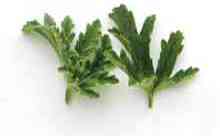 |
| |
|
- Cumin
These tiny seeds add a nutty, peppery flavor that's
popular in Mexican, Tex-Mex, Indian and Middle
Eastern cuisine. If you've ever had curry, then
you've had cumin, as it is a key part of curry powder.
Cumin is so popular in some Middle Eastern regions
that it's kept in a shaker on the table, as salt and
pepper are kept in the United States.
Cumin is rich in iron, which is excellent for energy
and keeping your immune system healthy. It is also
known to benefit your digestive system, as cumin may
stimulate the secretion of pancreatic enzymes that
help with digestion and nutrient assimilation. Cumin
may also have cancer-fighting properties.
|
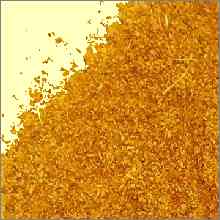 |
| |
|
- Summer Savory
Savory has a long history of medicinal use that dates
back to ancient Rome. It's been used for everything
from bee stings to flatulence
to promoting health during pregnancy. It's even said
to be an aphrodisiac.
Savory is a member of the mint family and has a peppery
flavor with mint and thyme undertones. Use it to enhance
the flavor of fish, vegetables (particularly tomatoes
and tomato sauce), cheese, eggs, pea soups and beans.
|
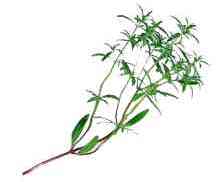 |
| |
|
 |
If you love fresh flavors and want to eat healthier,
Alive
in 5: Raw Gourmet Meals in Five Minutes is packed
with recipes you'll adore.
You can make fettuccine alfredo, fiesta tacos, spinach
and walnut pie and many other delicious meals -- all
using only raw ingredients!
|
| |
|
- Cilantro/Coriander Seeds
Coriander, one of the world's oldest spices, is
known in Europe as an "anti-diabetic"
plant because it helps control blood sugar. It also
has anti-inflammatory properties and may help to
lower cholesterol.
Coriander seeds have a flavor of citrus peel and
sage that works well with vegetables, fish, soups
and stews. You can even put the whole seeds in a
pepper mill and use them to season any dish you
like.
|
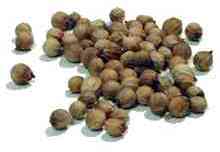 |
| |
|
- Turmeric
Ground turmeric, which lends a characteristic yellow
color to foods, is used in many Middle Eastern meat
and vegetable dishes. It has a peppery, slightly
bitter flavor that is a staple ingredient in curries.
Turmeric is a nutrition powerhouse. Most notably,
it contains curcumin, which gives it not only its
color but also many of its health benefits. Turmeric
has potent anti-inflammatory properties and has
been found to be helpful in fighting inflammatory
bowel diseases, including Crohn's disease and ulcerative
colitis, rheumatoid arthritis, cystic fibrosis,
cancer and Alzheimer's disease. It may also provide
cardiovascular and liver protection.
You can use turmeric for much more than cooking
curries. Add it to sautéed veggies, egg salad,
brown rice, salad dressings and dips or beans, particularly
lentils.
|
 |
| |
|
- Mustard Seeds
Mustard seeds belong to the incredibly healthy
cruciferous
plant family. Aside from being an excellent
source of selenium, mustard seeds contain phytonutrient
compounds that protect against gastrointestinal
cancer.
Mustards seeds are, of course, used to make all
varieties of mustard, from yellow to brown, but
you can also sprinkle them on fish and chicken or
use them to flavor sauces and salad dressings. You
can even make your own mustard sauce by soaking
mustard seeds in vinegar or water, then grinding
them into a paste. Add in some turmeric, garlic,
pepper, paprika and any other spices to taste and
you'll have your own homemade mustard.
|
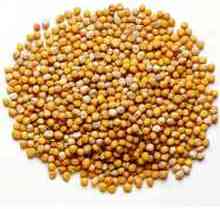 |
Recommended Reading
What
are the Best and Worst Cooking Oils for You?
Are
You Ready for Mediterranean Food to Make a Big Splash in the
U.S.?
Sources
The World's
Healthiest Foods
|